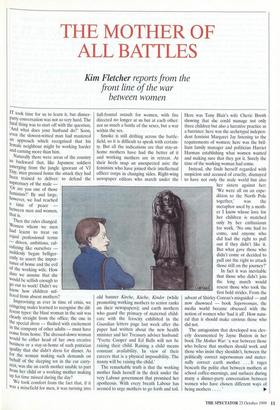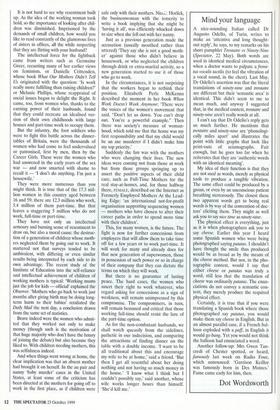THE MOTHER OF ALL BATTLES
Kim Fletcher reports from the front line of the war between women
IT took time for us to learn it, but dinner- party conversation was not so very hard. The fatal thing was to start off with the question, 'And what does your husband do?' Soon, even the slowest-witted man had mastered an approach which recognised that his female neighbour might be working harder and earning more than him.
Then the rules changed. Women whom we men had learnt to treat on equal professional terms — driven, ambitious, cal- culating like ourselves suddenly began belliger- ently to assert the impor- tance of home and the evil of the working wife. How dare we assume that she would be selfish enough to go out to work! Didn't we know how children suf- fered from absent mothers?
Improvising as ever in time of crisis, we eringeing males learned to recognise the dif- ferent types: the blasé woman in the suit was clearly straight from the office; the one in the special dress — flushed with excitement M the company of other adults — must have come from home. The dressed-down woman would be either head of her own creative business or a stay-at-home of such patrician quality that she didn't dress for dinner. As for the woman making such demands on behalf of the sleeping tot in the car carry- seat,. was she an earth mother unable to part from her child or a working mother making up for time missed during the day? We took comfort from the fact that, if it Was a minefield for men, it was turning into full-frontal assault for women, with fire directed no longer at us but at each other: not so much a battle of the sexes, but a war within the sex.
Smoke is still drifting across the battle- field, so it is difficult to speak with certain- ty. But all the indications are that stay-at- home mothers have had the better of it and working mothers are in retreat. At their heels snap an unexpected axis: the feminists who have joined their intellectual officer corps in changing sides. Right-wing newspaper editors who march under the
old banner Kirche, Kuche, Kinder (while promoting working mothers to senior ranks on their newspapers); and earth mothers who guard the primacy of maternal child- care with the ferocity exhibited in the Guardian letters page last week after the. paper had written about the new health minister and her Treasury adviser husband: 'Yvette Cooper and Ed Balls will not be raising their child. Raising a child means constant availability. In view of their careers that is a physical impossibility. The nanny will be raising the child.'
The remarkable truth is that the working mother finds herself in the dock under the very Labour government that promised her apotheosis. With every breath Labour has seemed to urge mothers to go forth and toil. Here was Tony Blair's wife Cherie Booth showing that she could manage not only three children but also a lucrative practice as a barrister; here was the archetypal indepen- dent feminist Margaret Jay listening to the requirements of women; here was the bril- liant family manager and politician Harriet Harman establishing what women wanted and making sure that they got it. Surely the time of the working woman had come.
Instead, she finds herself regarded with suspicion and accused of cruelty, dismayed to have not only the male world but also her sisters against her: We were all on an expe- dition to the North Pole
together,' was the metaphor used by a moth- er I know whose love for her children is matched only by her enthusiasm for work. 'No one had to come, and anyone who did had the right to pull out if they didn't like it. But what gave those who didn't come or decided to pull out the right to attack those still on the journey?'
In fact it was inevitable that those who didn't join the long march would resent those who took the first bold strides. From the advent of Shirley Conran's misguided — and now disowned — book Superwoman, the media world became obsessed with the notion of women who 'had it all'. How natu- ral that it should make envious those who did not.
The antagonism that developed was clev- erly documented by Jayne Buxton in her
book The Mother War 'a war between those
who believe that mothers should work and those who insist they shouldn't, between the politically correct superwoman and mater- nally correct earth mother ... It rages beneath the polite chat between mothers at school coffee-mornings, and surfaces during many a dinner-party conversation between women who have chosen different ways of being mothers . ' ► It is not hard to see why resentment built up. As the idea of the working woman took hold, so the importance of looking after chil- dren was diminished. Imprisoned by the demands of small children, how would you like to read constantly of the glamorous lives of sisters in offices, all the while suspecting that they are flirting with your husband?
The intellectual force for the fightback came from writers such as Germaine Greer, recanting many of her earlier views on feminism, or Danielle Crittenden, whose book What Our Mothers Didn't Tell Us originated with the question: 'Is work really more fulfilling than raising children?' or Melanie Phillips, whose reappraisal of social issues began to delight the Right. It came, too, from women who, thanks to the earning power of their husbands, found that they could recreate an idealised ver- sion of their own childhoods with large houses and part-time work to occupy them.
But the infantry, the foot soldiers who were to fight this battle across the dinner- tables of Britain, were the thousands of women who had come to feel undervalued or patronised, first by men, then by the Career Girls. These were the women who had answered in the early years of the sex war — and now smarted with shame to recall it — 'I don't do anything. I'm just a housewife.'
They were more numerous than you might think. It is true that of the 17.3 mil- lion women in this country aged between 16 and 59, there are 12.3 million who work, 5.4 million of them part-time. But that leaves a staggering 5 million who do not work, full-time or part-time.
They have not only an intellectual armoury and burning sense of resentment to draw on, but also a moral cause: the destruc- tion of a generation of children whose moth- ers neglected them by going out to work. It mattered not that surveys tended to be ambivalent, with differing or even similar results being interpreted by each side to its own advantage. The recent study of the Institute of Education into the self-reliance and intellectual achievement of children of working mothers is typical: 'Working mums just the job for kids — official' explained the Observer. 'Mothers who go back to work just months after giving birth may be doing long- term harm to their babies' retaliated the Daily Mail the next day, a conclusion drawn from the same set of statistics.
Brave indeed were the women who admit- ted that they worked not only to make money (though such is the motivation of that huge majority who don't have the luxury of joining the debate) but also because they liked to. With children needing mothers, this was selfishness indeed.
And when things went wrong at home, the clear implication was that an absent mother had brought it on herself. In the au pair and nanny 'baby murder' cases in the United States, at least some of the criticism has been directed at the mothers for going off to work in the first place, as if children were safe only with their mothers. Nict;'.... Horlick, the businesswoman with the temerity to write a book implying that she might be 'having it all', was efficiently whacked down to size when she fell out with her nanny.
Just as a previous generation made the accusation (usually mouthed rather than uttered) 'They say she is not a good moth- er' against those who didn't believe in housework, or who neglected the children through drink or extra-marital activity, so a new generation started to use it of those who go to work.
In the circumstances, it is not surprising that the workers began to rethink their position. Elizabeth Perle McKenna described the moment in her book When Work Doesn't Work Anymore: 'There were the voices of the women's movement that said, "Don't let us down. You can't drop out. You're a powerful example." Then there was society's measure of woman- hood, which told me that the home was my first responsibility and that my child would be an axe murderer if I didn't make him my top priority.'
Suddenly the fun was with the mothers who were changing their lives. The new ideas were coming not from those at work but from those groups springing up to assert the positive aspects of their child care, such as Full-Time Mothers for the real stay-at-homes, and, for those halfway there, FEMALE, described on the Internet as Formerly Employed Mothers At the Lead- ing Edge: 'an international not-for-profit organisation supporting sequencing women — mothers who have chosen to alter their career paths in order to spend more time with their children'.
This, for many women, is the future. The fight is now for further concessions from employers that will allow them to take time off for a few years or to work part-time. It will work for many and already does for that new generation of superwomen, those in possession of such power or so in charge of their company that they can dictate the terms on which they will work.
But there is no guarantee of lasting peace. The hard cases, the women who assert their right to work whatever, who regard asking for concessions as a sign of weakness, will remain unimpressed by this compromise. The compromisers, in turn, will remain bemused and critical that those working full-time should resist the lure of the part-time option.
As for the non-combatant husbands, we shall watch queasily from the sidelines, pathetic in our indecision, and comparing the attractions of finding dinner on the table with a double income. 'I want to be all traditional about this and encourage my wife to be at home,' said a friend. 'But then I get all resentful about her doing nothing and not having so much money in the house.' I know what I think but I couldn't possibly say,' said another, whose wife works longer hours than himself. 'She'd kill me.'



















































































 Previous page
Previous page